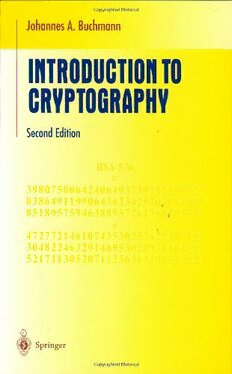Table Of ContentUndergraduate Texts in Mathematics
Editors
S.Axler
rw
Gehring
K.A. Ribet
Springer
NewYork
Berlin
Heidelberg
HongKong
London
Milan
Paris
Tokyo
http://avaxhome.ws/blogs/ChrisRedfield
UndergraduateTextsin Mathematics
Abbott: Understanding Analysis. Childs:AConcrete Introduction to
Anglin: Mathematics:AConcise History HigherAlgebra.Second edition.
andPhilosophy. Chung/AitSahlia: Elementary Probability
ReadingsinMathematics. Theory:WithStochastic Processes and
Anglin/Lambek:TheHeritageof anIntroduction toMathematical
Thales. Finance. Fourthedition.
ReadingsinMathematics. Cox/Little/O'Shea: Ideals, Varieties,
Apostol: Introduction toAnalytic andAlgorithms.Second edition.
NumberTheory.Second edition. Croom: BasicConcepts ofAlgebraic
Armstrong: BasicTopology. Topology.
Armstrong:GroupsandSymmetry. Curtis: LinearAlgebra:AnIntroductory
Axler: LinearAlgebraDoneRight. Approach.Fourth edition.
Secondedition. Daepp/Gorkin:Reading, Writing,and
Beardon: Limits:ANewApproachto Proving:ACloser Lookat
RealAnalysis. Mathematics.
BaklNewman: ComplexAnalysis. Devlin:TheJoyofSets:Fundamentals
Secondedition. ofContemporarySetTheory.
BanchofflWermer: LinearAlgebra Second edition.
Through Geometry.Secondedition. Dlxmler:GeneralTopology.
Berberian: AFirstCourseinReal Driver:WhyMath?
Analysis. Ebbinghaus/FlumlThomas:
Bix: ConicsandCubics:A Mathematical Logic.Second edition.
Concrete Introduction toAlgebraic Edgar: Measure,Topology,andFractal
Curves. Geometry.
Bremaud:AnIntroduction to Elaydi:AnIntroduction toDifference
Probabilistic Modeling. Equations.Second edition.
Bressoud: Factorization andPrimality Erdos/Suranyi: Topics intheTheory of
Testing. Numbers.
Bressoud:Second YearCalculus. Estep: Practical AnalysisinOneVariable.
ReadingsinMathematics. Exner: AnAccompaniment toHigher
Brickman:Mathematical Introduction Mathematics.
toLinearProgrammingandGame Exner: InsideCalculus.
Theory. Fine/Rosenberger: TheFundamental
Browder: Mathematical Analysis: TheoryofAlgebra.
AnIntroduction. Fischer: Intermediate RealAnalysis.
Buchmann: Introduction to Flanigan/Kazdan: Calculus Two:Linear
Cryptography, Secondedition. andNonlinear Functions.Second
Buskes/van Rooij: Topological Spaces: edition.
FromDistancetoNeighborhood. Fleming: Functions ofSeveral Variables.
Callahan:TheGeometryofSpacetime: Second edition.
AnIntroduction toSpecialandGeneral Foulds:Combinatorial Optimization for
Relavitity. Undergraduates.
Carter/van Brunt:The Lebesgue Foulds:Optimization Techniques:An
Stieltjes Integral:APractical Introduction.
Introduction.
(continuedafterindex)
Cederberg:ACourse inModem
Geometries.Secondedition.
Johannes Buchmann
Introduction to
Cryptography
Second Edition
, Springer
JohannesA.Buchmann
DepartmentofComputerScience
'TechnicalUniversity, Darmstadt
Hochschulstr, 10
64289Darmstadt
Germany
EditorialBoard
S.Alder F.w.Gehring K.A.Ribet
MathematicsDepartment MathematicsDepartment MathematicsDepartment
San FranciscoState East Hall UniversityofCalifornia
University UniversityofMichigan Berkeley
San Francisco,CA94132 Ann Arbor,MI48109 Berkeley, CA94720-3840
USA USA USA
[email protected] [email protected] [email protected]
Cover:The factorizationofRSA-576,a576-bitor 174-digitprimenumber,wasthe goalofan
openchallengesponsoredby RSALaboratories(Bedford,Mass.).RSA-576wasfactoredbya
teamofresearchersinGermanyand othercountriesin December, 2003.
MathematicsSubjectClassification(2000):94-01,94A60,11T7l
Library ofCongressCatalogingin PublicationData
Buchmann,Johannes.
IntroductiontocryptographyI JohannesBuchmann.- [2nded.].
p.ern.- (Undergraduatetexts in mathematics)
Includesbibliographicalreferencesandindex.
ISBN0-387-21156-X(hardcover: alk.paper)- ISBN0-387-20756-2(softcover: alk.paper)
1.Codingtheory. 2.Cryptography. I.Title. 11Series.
QA268.B832004
003'.54-dc22 2004041657
ISBN0-387-21156-X Printedonacid-freepaper.
Germanedition:EinfurungindieKryptographieII.'Springer-Verlag, Heidelberg,1999.11.'2004,
2001Springer-VerlagNY,LLC
Allrightsreserved.This work may notbe translatedorcopiedinwhole or inpartwithout
the written permissionofthe publisher(Springer-VerlagNewYork,LLC,175FifthAvenue,
NewYork,NY10010,USA),except forbriefexcerptsinconnectionwith reviewsorscholarly
analysis.Usein connectionwith any form ofinformationstorage andretrieval,electronic
adaptation, computer software, or by similar or dissimilar methodology now known or
hereafterdevelopedisforbidden.
The use inthis publicationoftrade names,trademarks,service marks,and similarterms,
eveniftheyare not identifiedassuch,isnot tobe takenasan expression ofopinionasto
whetherornot theyare subjecttoproprietaryrights.
PrintedintheUnited States ofAmerica (BP/EB)
98654321 SPIN10991503(hardcover) - SPIN10963999(softcover)
Springer-Verlagisapart ofSpringerScience+BusinessMedia
springeronline.com
For Almut, Daniel, andJan
Contents
Preface for the Second Edition xiii
Preface xv
1 Integers 1
1.1 Basics. . . . . .. . . . .. 1
1.2 Divisibility . . . . . . . . . 3
1.3 Representation of Integers 4
1.4 0-and Q-Notation . . . . . 6
1.5 Cost ofAddition, Multiplication, and Division with
Remainder . . . . . . . . . 7
1.6 Polynomial Time . . . . . 9
1.7 Greatest Common Divisor 9
1.8 Euclidean Algorithm ... 12
1.9 Extended Euclidean Algorithm . 16
1.10 Analysis ofthe Extended Euclidean Algorithm 18
1.11 Factoring into Primes 22
1.12 Exercises . . . . . . . . . . . . . . . 24
2 Congruences and Residue Class Rings 29
2.1 Congruences . 29
..
Vll
V111 Contents
2.2 Semigroups . 32
2.3 Groups . 34
2.4 Residue Class Ring . 35
2.5 Fields . 36
2.6 Division in the Residue Class Ring . 36
2.7 Analysis ofthe Operations in the Residue Class Ring 38
2.8 Multiplicative Group ofResidues mod m 39
2.9 Order ofGroup Elements 41
2.10 Subgroups . 42
2.11 Fermat's Little Theorem 44
2.12 Fast Exponentiation . . . 45
2.13 Fast Evaluation of Power Products 48
2.14 Computation ofElement Orders . 49
2.15 The Chinese RemainderTheorem 51
2.16 Decomposition ofthe Residue Class Ring 53
2.17 AFormula for the Eulercp-Function 55
2.18 Polynomials . . . . . . . . . 56
2.19 Polynomials over Fields. . . . . . . 58
2.20 Construction ofFinite Fields . . . . 61
2.21 The Structure of the Unit Group of Finite Fields 65
2.22 Structure ofthe Multiplicative Group of Residues
Modulo a Prime Number 66
2.23 Exercises . 67
3 Encryption 71
3.1 Encryption Schemes . 71
3.2 Symmetric and Asymmetric Cryptosystems 73
3.3 Cryptanalysis . . . . 74
3.4 Alphabets and Words 77
3.5 Permutations . . . . . 80
3.6 BlockCiphers . . . . 81
3.7 Multiple Encryption . 82
3.8 The Use of BlockCiphers 83
3.9 Stream Ciphers ... .. 93
3.10 The Affine Cipher . . . . 95
3.11 Matrices and Linear Maps 97
3.12 Affine Linear BlockCiphers 102
3.13 Vigenere, Hill, and Permutation Ciphers 103
Contents
3.14 Cryptanalysis ofAffine Linear BlockCiphers . 104
3.15 Secure Cryptosystems . 105
3.16 Exercises . .. . . ... .. . III
4 Probability and Perfect Secrecy 115
4.1 Probability . ... ... 115
4.2 Conditional Probability 117
4.3 Birthday Paradox . . . . 118
4.4 PerfectSecrecy . . . . . 119
4.5 Vernam One-Time Pad 123
4.6 Random Numbers . . . 124
4.7 Pseudorandom Numbers 124
4.8 Exercises . . . ... ... 125
5 DES 127
5.1 Feistel Ciphers . 127
5.2 DESAlgorithm. 128
5.3 An Example . . 134
5.4 Security of DES 136
5.5 Exercises . . .. 137
6 AES 139
6.1 Notation . . . 139
6.2 Cipher .... 140
6.3 KeyExpansion 145
6.4 An Example 146
6.5 InvCipher 148
6.6 Exercises . . 148
7 Prime Number Generation 151
7.1 ThaI Division . . . . . 151
7.2 FermatTest . . . . . . 153
7.3 Carmichael Numbers 154
7.4 Miller-RabinTest . 156
7.5 Random Primes 159
7.6 Exercises ... . . 160

